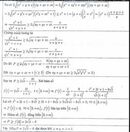TÌm Max:
A=\(\frac{xy\sqrt{z-6}+yz\sqrt{x-2}+zx\sqrt{y-4}}{xyz}\)
Cho x,y,z >0 tm xy+yz+zx=xyz. Tìm GTLN của:
\(A=\frac{1}{\sqrt{x^2-xy+y^2}}+\frac{1}{\sqrt{y^2-yz+z^2}}+\frac{1}{\sqrt{z^2-zx+x^2}}\)
\(A=\frac{1}{\sqrt{x^2-xy+y^2}}+\frac{1}{\sqrt{y^2-yz+z^2}}+\frac{1}{\sqrt{z^2-zx+x^2}}\)
\(=\frac{1}{\sqrt{\frac{1}{2}\left(x-y\right)^2+\frac{1}{2}\left(x^2+y^2\right)}}+\frac{1}{\sqrt{\frac{1}{2}\left(y-z\right)^2+\frac{1}{2}\left(y^2+z^2\right)}}+\frac{1}{\sqrt{\frac{1}{2}\left(z-x\right)^2+\frac{1}{2}\left(z^2+x^2\right)}}\)
\(\le\frac{1}{\sqrt{\frac{1}{2}\left(x^2+y^2\right)}}+\frac{1}{\sqrt{\frac{1}{2}\left(y^2+z^2\right)}}+\frac{1}{\sqrt{\frac{1}{2}\left(z^2+x^2\right)}}\)
\(\le\frac{2}{x+y}+\frac{2}{y+z}+\frac{2}{z+x}\le\frac{1}{x}+\frac{1}{y}+\frac{1}{z}=1\)
Cho x, y, z là các số thực dương thoả mãn xyz=1. Tìm GTNN của P = \(\frac{x^3+1}{\sqrt{x^4+y+z}}+\frac{y^3+1}{\sqrt{y^4+z+x}}+\frac{z^3+1}{\sqrt{z^4+x+y}}-\frac{8\left(xy+yz+zx\right)}{xy+yz+zx+1}\)

Cho xy+yz+zx=2xyz ; x,y,z>0 Tìm max \(A=\sqrt{\frac{x}{2y^2z^2+xyz}}+\sqrt{\frac{y}{2x^2z^2+xyz}}+\sqrt{\frac{z}{2x^2y^2+xyz}}\)
\(A=\sqrt{\frac{x}{2y^2z^2+xyz}}+\sqrt{\frac{y}{2x^2z^2+xyz}}+\sqrt{\frac{z}{2x^2y^2+xyz}}\)
\(A=\sqrt{\frac{x^2}{2xyz.yz+xz.xy}}+\sqrt{\frac{y^2}{2xyz.xz+xy.yz}}+\sqrt{\frac{z^2}{2xyz.xy+xz.yz}}\)
\(A=\sqrt{\frac{x^2}{yz\left(xy+yz+xz\right)+xz.xy}}+\sqrt{\frac{y^2}{xz\left(xy+yz+xz\right)+xy.yz}}+\sqrt{\frac{z^2}{xy\left(xy+yz+xz\right)+xz.yz}}\)
\(A=\sqrt{\frac{x^2}{\left(yz+xy\right)\left(yz+xz\right)}}+\sqrt{\frac{y^2}{\left(xz+xy\right)\left(xz+yz\right)}}+\sqrt{\frac{z^2}{\left(xy+yz\right)\left(xy+xz\right)}}\)
Áp dụng bđt \(\sqrt{ab}\le\frac{a+b}{2}\) ta có:
\(2A\le\frac{x}{yz+xy}+\frac{x}{yz+xz}+\frac{y}{xz+xy}+\frac{y}{xz+yz}+\frac{z}{xy+yz}+\frac{z}{xy+xz}\)
\(=\frac{x+z}{yz+xy}+\frac{x+y}{yz+xz}+\frac{y+z}{xz+xy}=\frac{1}{x}+\frac{1}{y}+\frac{1}{z}\)
Mà: \(xy+yz+xz=2xyz\Rightarrow\frac{1}{x}+\frac{1}{y}+\frac{1}{z}=2\)
\(\Rightarrow2A\le2\Rightarrow A\le1."="\Leftrightarrow a=b=c=\frac{3}{2}\)
tìm Max của\(P=\frac{x}{\sqrt{yz\left(1+x^2\right)}}+\frac{y}{\sqrt{zx\left(1+y^2\right)}}+\frac{z}{\sqrt{xy\left(1+z^2\right)}}\)với x y z > 0 và xy+yz+xz=xyz
Giải hệ PT sau: \(\hept{\begin{cases}3\sqrt{x}+2\sqrt{y}+\sqrt{z}=\frac{\sqrt{xyz}}{6}\\6\sqrt{xy}+2\sqrt{yz}+3\sqrt{zx}=108+18\sqrt{x+4}+12\sqrt{y+9}+6\sqrt{z+36}\end{cases}}\)
5 .\(\frac{x}{\sqrt{2\left(y^2+z^2\right)-x^2}}=\frac{\sqrt{3}x^2}{\sqrt{3}x\sqrt{2\left(y^2+z^2\right)-x^2}}\ge\frac{\sqrt{3}x^2}{x^2+y^2+z^2}\)
TT=>VT2>=VP2
6.\(1+\sqrt{y-1}\ge1\)
\(\frac{1}{y^2}-\left(x+z\right)^2\le1\)
=>VT1>=VP1
10b pt1\(\Leftrightarrow\left(y-3x\right)\left(y^2-y+1\right)=0\)
chi. cậu trả lời j vào câu hỏi của tớ vậy???
mượn 1 tí thôi tại mai bảo là ghi đại vào đâu đấy
Cho \(N=\frac{\sqrt{x}}{\sqrt{xy}+\sqrt{x}+2}+\frac{\sqrt{y}}{\sqrt{yz}+\sqrt{y}+1}+\frac{2\sqrt{x}}{\sqrt{zx}+2\sqrt{z}+2}\). Biết xyz = 4. Tính √N
Bạn tham khảo lời giải tại đây:
Cho các số thực dương x, y, z thõa mãn \(\sqrt{xy}+\sqrt{yz}+\sqrt{zx}=\sqrt{xyz}\). tìm giá trị nhỏ nhất của biểu thức P=\(\frac{1}{xyz}\left(x\sqrt{2y^2+yz+2z^2}+y\sqrt{2z^2+xz+2x^2}+z\sqrt{2x^2+xy+2y^2}\right)\)
Ta có \(\sqrt{xy}+\sqrt{yz}+\sqrt{zx}=\sqrt{xyz}\left(x,y,z>0\right)\).
\(\Leftrightarrow\frac{1}{\sqrt{x}}+\frac{1}{\sqrt{y}}+\frac{1}{\sqrt{z}}=1\).
\(P=\frac{1}{xyz}\left(x\sqrt{2y^2+yz+2z^2}+y\sqrt{2z^2+xz+2x^2}+z\sqrt{2x^2+xy+y^2}\right)\)\(\left(x,y,z>0\right)\).
Ta có:
\(\sqrt{2y^2+2yz+2z^2}=\sqrt{\frac{5}{4}\left(y^2+2yz+z^2\right)+\frac{3}{4}\left(y^2-2yz+z^2\right)}\)
\(=\sqrt{\frac{5}{4}\left(y+z\right)^2+\frac{3}{4}\left(y-z\right)^2}\).
Ta có:
\(\frac{3}{4}\left(y-z\right)^2\ge0\forall y;z>0\).
\(\Leftrightarrow\frac{3}{4}\left(y-z\right)^2+\frac{5}{4}\left(y+z\right)^2\ge\frac{5}{4}\left(y+z\right)^2\forall y;z>0\).
\(\Rightarrow\sqrt{\frac{3}{4}\left(y-z\right)^2+\frac{5}{4}\left(y+z\right)^2}\ge\frac{\sqrt{5}}{2}\left(y+z\right)\forall y,z>0\).
\(\Leftrightarrow\sqrt{2y^2+yz+2z^2}\ge\frac{\sqrt{5}}{2}\left(y+z\right)\forall y;z>0\).
\(\Leftrightarrow x\sqrt{2y^2+yz+2z^2}\ge\frac{\sqrt{5}}{2}x\left(y+z\right)\forall x;y;z>0\left(1\right)\).
Chứng minh tương tự, ta được:
\(y\sqrt{2x^2+xz+2z^2}\ge\frac{\sqrt{5}}{2}y\left(x+z\right)\forall x;y;z>0\left(2\right)\).
Chứng minh tương tự, ta được:
\(z\sqrt{2x^2+xy+2y^2}\ge\frac{\sqrt{5}}{2}z\left(x+y\right)\forall x;y;z>0\left(3\right)\).
Từ \(\left(1\right),\left(2\right),\left(3\right)\), ta được:
\(x\sqrt{2y^2+yz+2z^2}+y\sqrt{2z^2+xz+2x^2}+z\sqrt{2x^2+xy+2y^2}\)\(\ge\)\(\frac{\sqrt{5}}{2}\left[x\left(y+z\right)+y\left(x+z\right)+z\left(x+y\right)\right]=\sqrt{5}\left(xy+yz+zx\right)\).
\(\Leftrightarrow\frac{1}{xyz}\left(x\sqrt{2y^2+yz+z^2}+y\sqrt{2z^2+zx+2x^2}+z\sqrt{2x^2+xy+2y^2}\right)\)\(\ge\)\(\frac{\sqrt{5}\left(xy+yz+zx\right)}{xyz}=\sqrt{5}\left(\frac{1}{x}+\frac{1}{y}+\frac{1}{z}\right)\).
\(\Leftrightarrow P\ge\frac{\sqrt{5}}{3}.3\left(\frac{1}{x}+\frac{1}{y}+\frac{1}{z}\right)=\frac{\sqrt{5}}{3}\left(1^2+1^2+1^2\right)\left[\left(\frac{1}{\sqrt{x}}\right)^2+\left(\frac{1}{\sqrt{y}}\right)^2+\left(\frac{1}{\sqrt{z}}\right)^2\right]\)
\(\left(4\right)\).
Vì \(x,y,z>0\)nên áp dụng bất đẳng thức Bu-nhi-a-cốp-xki, ta được:
\(\left(1^2+1^2+1^2\right)\left[\left(\frac{1}{\sqrt{x}}\right)^2+\left(\frac{1}{\sqrt{y}}\right)^2+\left(\frac{1}{\sqrt{z}}\right)^2\right]\ge\)\(\left(1.\frac{1}{\sqrt{x}}+1.\frac{1}{\sqrt{y}}+1.\frac{1}{\sqrt{z}}\right)^2\).
\(\Leftrightarrow\left(1^2+1^2+1^2\right)\left[\left(\frac{1}{\sqrt{x}}\right)^2+\left(\frac{1}{\sqrt{y}}\right)^2+\left(\frac{1}{\sqrt{z}}\right)^2\right]\ge\left(\frac{1}{\sqrt{x}}+\frac{1}{\sqrt{y}}+\frac{1}{\sqrt{z}}\right)^2=1^2=1\)
(vì\(\frac{1}{\sqrt{x}}+\frac{1}{\sqrt{y}}+\frac{1}{\sqrt{z}}=1\)).
\(\Leftrightarrow\frac{\sqrt{5}}{3}\left(1^2+1^2+1^2\right)\left[\left(\frac{1}{\sqrt{x}}\right)^2+\left(\frac{1}{\sqrt{y}}\right)^2+\left(\frac{1}{\sqrt{z}}\right)^2\right]\ge\frac{\sqrt{5}}{3}\)\(\left(5\right)\).
Từ \(\left(4\right)\)và \(\left(5\right)\), ta được:
\(P\ge\frac{\sqrt{5}}{3}\).
Dấu bằng xảy ra.
\(\Leftrightarrow\hept{\begin{cases}x=y=z>0\\\sqrt{xy}+\sqrt{yz}+\sqrt{zx}=\sqrt{xyz}\end{cases}}\Leftrightarrow x=y=z=9\).
Vậy \(minP=\frac{\sqrt{5}}{3}\Leftrightarrow x=y=z=9\).
Cho x y z > 0 và xyz=1. Tìm Min \(P=\frac{\sqrt{1+x^2+y^2}}{xy}+\frac{\sqrt{1+y^2+z^2}}{yz}+\frac{\sqrt{1+z^2+x^2}}{zx}\)
\(P=\frac{\sqrt{1+x^2+y^2}}{xy}+\frac{\sqrt{1+y^2+z^2}}{yz}+\frac{\sqrt{1+z^2+x^2}}{zx}\)
\(\ge\text{Σ}\frac{\sqrt{\frac{\left(1+x+y\right)^2}{3}}}{xy}\text{=}\frac{1+x+y}{xy\sqrt{3}}\)
\(=\frac{\sqrt{3}}{3}\left(\frac{1+x+y}{xy}+\frac{1+y+z}{yz}+\frac{1+z+x}{zx}\right)\)
\(=\frac{\sqrt{3}}{3}\left(\frac{1}{xy}+\frac{1}{yz}+\frac{1}{xz}+\frac{1}{x}+\frac{1}{y}+\frac{1}{y}+\frac{1}{z}+\frac{1}{z}+\frac{1}{x}\right)\)
\(=\frac{\sqrt{3}}{3}\left(x+y+z+2xy+2yz+2zx\right)\)\(\ge\frac{\sqrt{3}}{3}\left(3\sqrt[3]{xyz}+2\cdot3\sqrt[3]{x^2y^2z^2}\right)=\frac{\sqrt{3}}{3}\left(3+6\right)=3\sqrt{3}\)
Dấu = xảy ra khi \(x=y=z=1\)
Cho ba số x, y, z>0. Chứng minh rằng:
\(\frac{2}{x+\sqrt{yz}}+\frac{2}{y+\sqrt{zx}}+\frac{2}{z+\sqrt{xy}}\le\frac{\sqrt{x}+\sqrt{y}+\sqrt{z}}{\sqrt{xyz}}\)